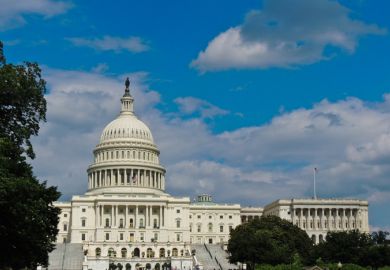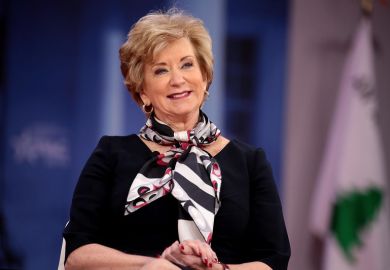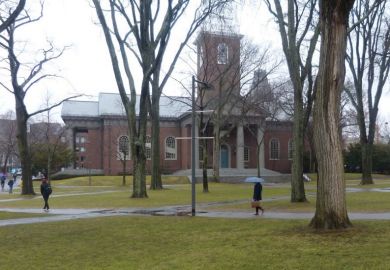The new president of Boston University has stressed the need for elite college leaders to focus on their day jobs in “the eye of the storm” ahead of Donald Trump’s inauguration.
Melissa Gilliam was recently inaugurated as Boston’s 11th president amid fears that the president-elect’s policies will target students, institutions, and leaders themselves.
The sector will also have to deal with the challenges of an upcoming “enrolment cliff” bringing an expected drop in domestic recruitment, a globally competitive international market, and continuing concerns around protests and freedom of speech, but Professor Gilliam said the biggest issue was “over-anticipation”.
“I think people lose a lot of their energy and resources to fear and speculation versus focusing on what’s actually happening,” she told Times Higher Education.
The physician said there were many bipartisan issues that colleges should be focusing on, instead of “stick[ing] your finger in the wind and start[ing to] worrying about things that haven’t happened yet”.
“There are many things that the education sector actually just has to do better and again I think we often say it depends on the administration, but many of those things are in our control,” she said.
“I think what you do is you look for the ‘through lines’, you look for things that people care about.”
Having spent most of her academic career at the University of Chicago, Professor Gilliam served as executive vice-president and provost at Ohio State University – at a time when the institution was directly targeted by state legislation on diversity, equality and inclusion activities.
That “spotlight” can make the work harder, Professor Gilliam said, but at such times goes back to her medical training – remembering to “quiet down and not be responsive and not get excited and not get fearful”.
“It’s actually really important that, even when you are in the eye of the storm, you have to focus on your day-to-day work,” she said.
“It’s incredibly important not to work from a place of fear, but to know that you have…a community of people counting on you to do your job each and every day, and that really is the most important thing.”
In terms of her own challenges at Boston, one of Professor Gilliam’s first priorities has been solving the underinvestment in the institution’s medical centre and fixing the misalignment between Boston and “one of the great safety net hospitals in the country” nearby.
“One of the things that I focused a lot on is building our relationship with Boston Medical Center so that we can really act as if we are integrated and really get the full benefits for our patients, our physicians, our scientists, our medical students, so it’s a big lift,” she said.
Other focus areas have been culture and values, and civil discourse – particularly crucial in recent times in an institution that has one of the largest Jewish populations in US higher education, alongside a large number of Palestinian and Muslim students.
Despite this “complicated community”, Professor Gilliam said the campus environment has been largely calm this year and that she would try to walk a careful balance.
“We really tried to consistently lean very much towards free speech, even if it’s not the easiest thing for the university and the administration, because I’m always thinking about the university long-term,” she said.
“I don’t want to make a rule or a decision that is convenient for me now, that years from now is not something that someone can live by.”
Having been the first black woman to serve as provost of Ohio State, Professor Gilliam is now the first female president and the first black president of Boston since its founding in 1839.
“It’s funny because when I was hired…I actually hadn’t thought very much about it, which is really almost quite naive…and I think partly it’s because I’ve been in this situation many, many times,” she said.
It is not something she spends much time dwelling on, but she is aware of the wider effects of her leadership on others.
“I have not necessarily aspired to higher ed leadership…but one of the reasons I did it is because representation really matters and it’s not just to people who look like me, it’s to people who don’t look like me,” she said.
“I hear from a wide variety of faculty, staff, students [that] when something that you didn’t believe was possible happens, that is inspiring to people…It creates a sense of hope about things that can be different.”
Register to continue
Why register?
- Registration is free and only takes a moment
- Once registered, you can read 3 articles a month
- Sign up for our newsletter
Subscribe
Or subscribe for unlimited access to:
- Unlimited access to news, views, insights & reviews
- Digital editions
- Digital access to THE’s university and college rankings analysis
Already registered or a current subscriber?








